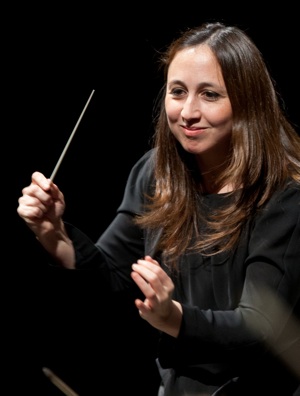
Young voices, ancient sorrows
Maestra Joana Carneiro led the Berkeley Symphony in a marvelous season finale at Zellerbach Hall last Thursday, April 30, in their first partnership with the UC Berkeley Chorus and Chamber Chorus. In a program titled “Homage” they came together for two powerful statements – meditations on murder and death.
The mostly young singers (UC students and alumnae) shone spectacularly in the choruses of John Adams’ The Death of Klinghoffer, an opera that remains controversial for its treatment of a charged subject, the murder of Leon Klinghoffer at the hands of Palestinian terrorists. And then they filled the hall with Mozart’s Requiem, a Mass for the dead that turned into Mozart’s own requiem as well, as he died while writing it.
Composed shortly before the attack of 9/11, Adams had chosen to look at terrorists and Middle East tensions through the lens of the Palestine Liberation Front hijacking of an Italian cruise ship, the Achille Lauro, and the attendant death of one of its passengers, the elderly Jewish invalid Klinghoffer.
Exploring terrorism through opera was a first, and it remains controversial to this day. But for Adams it was another stepping stone through the junction of the personal and the political: in his earlier opera, Nixon in China, he explored the historic meeting of Nixon and Chairman Mao, and in his 2005 Dr Atomic he tells of the creation of the atom bomb at Los Alamos through the complex personality of Dr. J. Robert Oppenheimer. All three operas paint their subjects in numerous shades of good and evil.
In the “Chorus of Exiled Palestinians” Adams stretches a wide and spare canvas, grieving women’s voices against the low, soft bowing of basses, and then anger blooming as rhythmic pounding. Then the combined UC choruses sang of the deep connection of the Jews and their land with gorgeous harmonies and a shivering sadness. In the “Night Chorus” we could hear the heady rhythms and firm development that Adams also used in Dr. Atomic in the hair-raising “Vishnu Chorus.” It was ethereal and powerful stuff.
According to Aubrey Allicock, a bass-baritone who sang the part of one of the hijackers in an earlier production, “It is about the death, not just of Klinghoffer, but of humanity.”
Although Klinghoffer has caused much reaction, most recently at the Metropolitan Opera, it is not only compelling art, but a deeply felt look into the bitterness that connects and divides two peoples, driven by persuasive music and the stunning poetry of Alice Goodman.
Then we were gripped by Mozart’s last work.
After the vigorous and challenging contemporary work, the musicians and singers were on their game, and those choruses, well prepared by Marika Kuzma, showed firmness in every part along with clarity and excellent intonation. Leading them were four outstanding soloists, Adler fellows who are already making names on major stages (including the SF Opera). Of particular note were the perfectly silvered tones of soprano Jacqueline Piccolino and the magnificent density of Latvian mezzo-soprano Zanda Švēde.
“This isn’t a Mozart orchestra,” stated a musician afterwards. “If you want that you can go to Philharmonia Baroque or George Cleve [Midsummer Mozart].” I was surprised. Those worthies may invoke rounder gestures or a period graciousness, but the intensity of the Berkeley Symphony musicians, still glowing from their Klinghoffer triumph, was undeniable.
—Adam Broner
Photos: top, of Joana Carneiro, photo by Dave Weiland; below, soloists Zanda Svede, left, and Jacqueline Picolino, right; photos courtesy of the artists.
